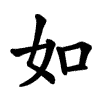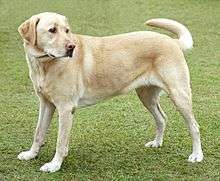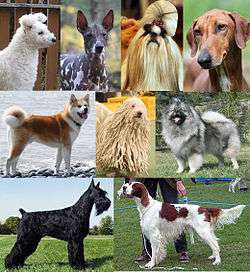Definify.com
Definition 2026
犬
犬
Translingual
| Stroke order | |||
|---|---|---|---|

| |||
Alternative forms
- 犭 (when used as a left Chinese radical)
Although the alternative form clearly shows only three strokes, it is still counted as four strokes when using a Chinese dictionary. Compare 氵 from 水 (“water”), 扌 from 手 (“hand”), and 忄 from 心 (“heart”), all of which are a 3-stroke form from a 4-stroke character.
Han character
犬 (radical 94 犬+0, 4 strokes, cangjie input 戈大 (IK), four-corner 43030, composition ⿻大丶)
- Kangxi radical #94, ⽝ (“dog”).
Usage notes
犬 is the 94th radical in the Chinese dictionary. Compound characters such as 狇 mostly use the alternative form at the left of the character. Most represent something to do with dogs or other animals. A smaller proportion (e. g. 狀) use the primary form at the right of the character. A few even show both forms: in 獄 which means "prison" or "litigation"; "words" (言) stand between two dogs to keep them from biting each other.
Derived characters
References
- KangXi: page 705, character 27
- Dai Kanwa Jiten: character 20234
- Dae Jaweon: page 1118, character 14
- Hanyu Da Zidian: volume 2, page 1331, character 1
- Unihan data for U+72AC
Chinese
|
simp. and trad. |
犬 | |
|---|---|---|

Glyph origin
| Historical forms of the character 犬
| ||||
|---|---|---|---|---|
| Oracle bone script | Bronze inscriptions | Bamboo and silk script | Large seal script | Small seal script |
 |
 |
 |
 |
 |
| Characters in the same phonetic series (犬) (Zhengzhang, 2003) | |
|---|---|
| Old Chinese | |
| 猚 | *ŋreːl, *rulʔ |
| 畎 | *kʷeːnʔ |
| 汱 | *kʷeːnʔ |
| 甽 | *kljuns, *kʷeːnʔ |
| 犬 | *kʰʷeːnʔ |
Pictogram (象形) – the dot is the ear. In the form 犭, a dog that is up on its hind legs.
Etymology
From Proto-Sino-Tibetan *d-kʷəj-n (“dog”).
This common Sino-Tibetan word has been replaced by 狗 (OC *koːʔ) in most dialects except a few Min dialects, such as Fuzhou kēng. In other dialects, this word is mainly found in compounds and not used alone.
Pronunciation
- Mandarin
- Cantonese (Jyutping): hyun2
- Hakka (Sixian, PFS): khién / khián
- Min Dong (BUC): kēng
- Min Nan (POJ): khián
- Wu (Wiktionary): qyoe (T2)
- Mandarin
- (Standard Chinese, Beijing)+
- Pinyin:
- Zhuyin: ㄑㄩㄢˇ
- Wade-Giles: ch'üan3
- Gwoyeu Romatzyh: cheuan
- IPA (key): /t͡ɕʰy̯ɛn²¹⁴/
- (Standard Chinese, Beijing)+
- Cantonese
- (Standard Cantonese, Guangzhou)+
- Jyutping: hyun2
- Yale: hyún
- Cantonese Pinyin: hyn2
- IPA (key): /hyːn³⁵/
- (Standard Cantonese, Guangzhou)+
- Hakka
- (Northern Sixian, incl. Miaoli)
- Pha̍k-fa-sṳ: khién
- Hakka Romanization System: kien`
- Hagfa Pinyim: kian3
- IPA: /kʰi̯en³¹/
- (Southern Sixian, incl. Meinong)
- Pha̍k-fa-sṳ: khián
- Hakka Romanization System: kian`
- Hagfa Pinyim: kian3
- IPA: /kʰi̯an³¹/
- (Northern Sixian, incl. Miaoli)
- Min Dong
- (Fuzhou)
- Bàng-uâ-cê: kēng
- IPA (key): /kʰɛiŋ³³/
- (Fuzhou)
- Min Nan
- (Hokkien)
- Pe̍h-ōe-jī: khián
- Tâi-lô: khián
- Phofsit Daibuun: qiern
- IPA (Xiamen): /kʰiɛn⁵³/
- IPA (Quanzhou): /kʰiɛn⁵⁵⁴/
- IPA (Zhangzhou): /kʰiɛn⁵³/
- IPA (Taipei): /kʰiɛn⁵³/
- IPA (Kaohsiung): /kʰiɛn⁴¹/
- (Hokkien)
- Wu
- (Shanghainese)
- Wiktionary: qyoe (T2)
- IPA (key): /t͡ɕʰyø³⁴/
- (Shanghainese)
- Dialectal data▼
| Variety | Location | 犬 |
|---|---|---|
| Mandarin | Beijing | /t͡ɕʰyan²¹⁴/ |
| Harbin | /t͡ɕʰyan²¹³/ | |
| Tianjin | /t͡ɕʰyan¹³/ | |
| Jinan | /t͡ɕʰyã⁵⁵/ | |
| Qingdao | /t͡ɕʰyã⁵⁵/ | |
| Zhengzhou | /t͡ɕʰyan⁵³/ | |
| Xi'an | /t͡ɕʰyã⁵³/ | |
| Xining | /t͡ɕʰyã⁵³/ | |
| Yinchuan | /t͡ɕʰyan⁵³/ | |
| Lanzhou | /t͡ɕʰyɛ̃n⁴⁴²/ | |
| Ürümqi | /t͡ɕyan⁵¹/ | |
| Wuhan | /t͡ɕʰyɛn⁴²/ | |
| Chengdu | /t͡ɕʰyan⁵³/ | |
| Guiyang | /t͡ɕʰian⁴²/ | |
| Kunming | /t͡ɕʰiɛ̃⁵³/ | |
| Nanjing | /t͡ɕʰyen²¹²/ | |
| Hefei | /t͡ɕʰyĩ²⁴/ | |
| Jin | Taiyuan | /t͡ɕʰye¹¹/ |
| Pingyao | /t͡ɕʰye̞⁵³/ | |
| Hohhot | /t͡ɕʰye⁵³/ | |
| Wu | Shanghai | /t͡ɕʰyø³⁵/ |
| Suzhou | /t͡ɕʰiø⁵¹/ | |
| Hangzhou | /t͡sʰz̩ʷõ⁵³/ | |
| Wenzhou | /t͡ɕʰy³⁵/ | |
| Hui | Shexian | /t͡ɕʰye³⁵/ |
| Tunxi | /t͡ɕʰyɛ³¹/ | |
| Xiang | Changsha | /t͡ɕʰyẽ⁴¹/ |
| Xiangtan | /t͡ɕʰyẽ⁴²/ | |
| Gan | Nanchang | /t͡ɕʰyɵn²¹³/ |
| Hakka | Meixian | /kʰian³¹/ |
| Taoyuan | /kʰien³¹/ | |
| Cantonese | Guangzhou | /hyn³⁵/ |
| Nanning | /hyn³⁵/ | |
| Hong Kong | /hyn³⁵/ | |
| Min | Xiamen (Min Nan) | /kʰian⁵³/ |
| Fuzhou (Min Dong) | /kʰɛiŋ³²/ | |
| Jian'ou (Min Bei) | /kʰyiŋ²¹/ | |
| Shantou (Min Nan) | /kʰuaŋ⁵³/ | |
| Haikou (Min Nan) |
/xin³¹/ /kau²¹³/ 訓狗 |
| Rime | |
|---|---|
| Character | 犬 |
| Reading # | 1/1 |
| Initial (聲) | 溪 (29) |
| Final (韻) | 先 (86) |
| Tone (調) | Rising (X) |
| Openness (開合) | Closed |
| Division (等) | IV |
| Fanqie | 苦泫切 |
| Reconstructions | |
| Zhengzhang Shangfang |
/kʰwenX/ |
| Pan Wuyun |
/kʰʷenX/ |
| Shao Rongfen |
/kʰuɛnX/ |
| Edwin Pulleyblank |
/kʰwɛnX/ |
| Li Rong |
/kʰuenX/ |
| Wang Li |
/kʰiwenX/ |
| Bernard Karlgren |
/kʰiwenX/ |
| Expected Mandarin Reflex |
quǎn |
| Baxter-Sagart system 1.1 (2014) | |
|---|---|
| Character | 犬 |
| Reading # | 1/1 |
| Modern Beijing (Pinyin) |
quǎn |
| Middle Chinese |
‹ khwenX › |
| Old Chinese |
/*[k]ʷʰˤ[e][n]ʔ/ |
| English | dog |
Notes for Old Chinese notations in the Baxter-Sagart system: * Parentheses "()" indicate uncertain presence; | |
| Zhengzhang system (2003) | |
|---|---|
| Character | 犬 |
| Reading # | 1/1 |
| No. | 10736 |
| Phonetic component |
犬 |
| Rime group |
元 |
| Rime subdivision |
2 |
| Corresponding MC rime |
犬 |
| Old Chinese |
/*kʰʷeːnʔ/ |
Definitions
犬
Synonyms
| Dialectal synonyms of 狗 (“dog”) | ||
|---|---|---|
| Variety | Location | Words |
| Classical Chinese | 犬 | |
| Formal (Written Standard Chinese) | 狗 | |
| Mandarin | Beijing | 狗 |
| Taiwan | 狗 | |
| Jinan | 狗 | |
| Xi'an | 狗 | |
| Wuhan | 狗子、來富 | |
| Chengdu | 狗 | |
| Yangzhou | 狗 | |
| Hefei | 狗 | |
| Cantonese | Guangzhou | 狗 |
| Hong Kong | 狗 | |
| Taishan | 狗 | |
| Yangjiang | 狗 | |
| Gan | Nanchang | 狗 |
| Hakka | Meixian | 狗 |
| Miaoli (N. Sixian) | 狗仔 | |
| Liudui (S. Sixian) | 狗仔 | |
| Hsinchu (Hailu) | 狗、狗仔 | |
| Dongshi (Dabu) | 狗 | |
| Zhuolan (Raoping) | 狗 | |
| Yunlin (Zhao'an) | 狗 | |
| Jin | Taiyuan | 狗、狗兒 |
| Min Bei | Jian'ou | 狗 |
| Min Dong | Fuzhou | 犬 |
| Min Nan | Quanzhou | 狗 |
| Xiamen | 狗 | |
| Zhangzhou | 狗 | |
| Taipei | 狗、狗仔 | |
| Chaozhou | 狗 | |
| Shantou | 狗 | |
| Wu | Suzhou | 狗 |
| Wenzhou | 狗 | |
| Xiang | Changsha | 狗 |
| Shuangfeng | 狗 | |
Compounds
|
|
Descendants
Japanese
Kanji
Readings
Compounds
|
Etymology

| Kanji in this term |
|---|
| 犬 |
|
いぬ Grade: 1 |
| kun'yomi |
From Old Japanese. Derivation uncertain. Various theories exist, including derivation from ancient verb 往ぬ (inu, “to leave, to be gone”), from the way a dog will guard the house while the master is away; from a compound of 家 (ie, “house, home”) + 寝 (nu, “to sleep”, ancient monosyllabic form of modern 寝る neru); from ancient Japanese 狗 (enu, “puppy, dog”), itself of uncertain derivation; or as a borrowing from some other unknown language.
Pronunciation
Alternative forms
Noun
犬 (counter 匹, hiragana いぬ, katakana イヌ, romaji inu)
- dog; canine
- 犬に毎日餌を上げて下さい。
- Inu ni mainichi esa o agete kudasai.
- Please feed the dog every day.
- 犬に毎日餌を上げて下さい。
- one who is loyal (like a dog)
- a spy
References
- ↑ 2006, 大辞林 (Daijirin), Third Edition (in Japanese), Tōkyō: Sanseidō, ISBN 4-385-13905-9
- ↑ 1998, NHK日本語発音アクセント辞典 (NHK Japanese Pronunciation Accent Dictionary) (in Japanese), Tōkyō: NHK, ISBN 978-4-14-011112-3
Korean
Hanja
犬 • (gyeon)
Eumhun:
- Sound (hangeul): 견 (revised: gyeon, McCune-Reischauer: kyŏn, Yale: kyen)
- Name (hangeul): 개 견()
Synonyms
- 개 (gae)
Derived terms
- 犬公 (견공, gyeongong) (personification)
- 犬馬 (견마, gyeonma) dog and horse
- 犬儒 (견유, gyeonyu) cynic
- 犬猿 (견원, gyeonwon) dog and monkey
- 猛犬 (맹견, maenggyeon) fierce dog
- 猛犬 (애견, aegyeon) pet dog
- 鬪犬 (투견, tugyeon) fighting dog
Okinawan
Kanji
Etymology
Cognate with Old Japanese 犬 (inu).
Pronunciation
IPA(key): [ʔiŋ̍]
Noun
Compounds
Vietnamese
Han character
犬 (khuyển, chó, dặm)
- This term needs a translation to English. Please help out and add a translation, then remove the text
{{rfdef}}.